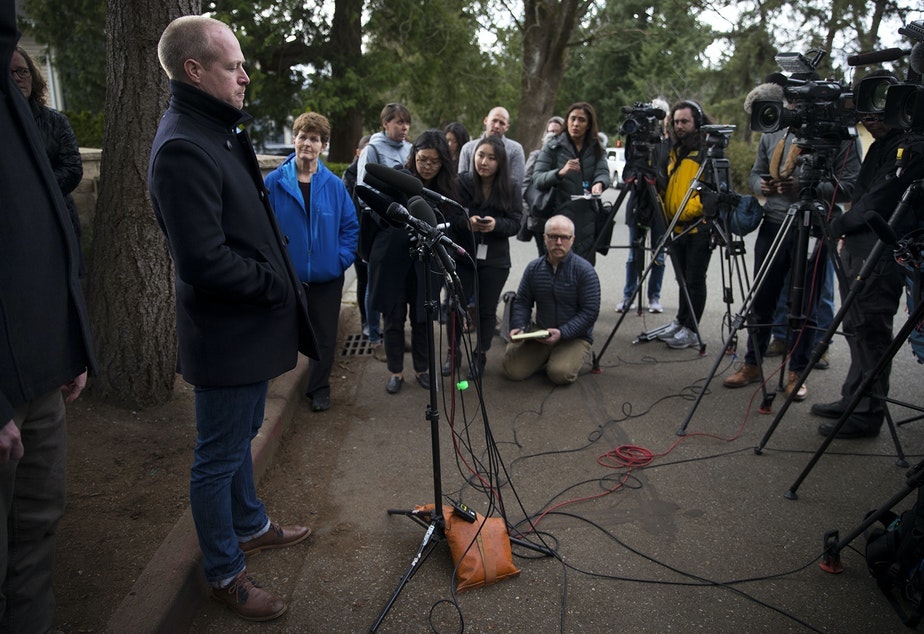Frustrated Washington nursing homes welcome new Covid-19 beds, PPE

When dozens of residents were falling sick at Life Care Center of Kirkland early in the coronavirus pandemic, family members like Kevin Connolly were frustrated with the lack of answers and resources.
“We want to know when our loved ones will be tested,” he said at a press conference. “We want specific information as it pertains to our loved one!”
In King County, more than 60% of Covid-19 deaths have been people connected to long-term care facilities.
This week state officials outlined plans for designated facilities and more protective gear to reduce virus transmission in nursing homes.
Nursing homes say those are tools they have needed badly.
Deb Murphy is the president of Leading Age Washington, which represents non-profit senior care providers. She said until recently, state rules around personal protective equipment put facilities in a catch-22.
Sponsored
“Unless you had a positive Covid case, you would not have access to testing or PPE,” she said. “And yet those were the very tools we need to mitigate against the spread of the virus.”
That catch-22 was on display last Friday in Snohomish County, according to Robin Dale, who heads the Washington Healthcare Association representing skilled nursing and assisted living facilities.
Dale said one hospital was ready to release two coronavirus-positive patients, and their assisted living facility was ready to take them.
“The assisted living facility was trying to help get these people home and take care of them in an assisted living building,” he said.
But the facility wasn’t eligible for any protective equipment because it was still technically “Covid-free.” Dale said he finally prevailed with state officials.
“Thankfully they heard my pleas and they got some PPE up to Snohomish County late Friday afternoon,” he said.
And the patients were successfully transferred home from the hospital.
Sponsored
Dale said there’s good news for long-term care facilities from Dr. Raquel Bono, who is heading up Washington’s Covid-19 health care response. Under new rules for PPE distribution, Dale said, ”now we are going to be top priority regardless of Covid status.”
Another priority has been designated long-term care facilities for Covid patients. Candace Goehring is director of residential care services for the state’s Department of Social and Health Services. She said her agency has just arranged for three facilities in Whatcom, King and Pierce counties to provide 150 beds in separate units from existing residents.
“So we have made some progress,” she said. “And we’re hoping in the next week or two that we’ll be working with local health jurisdictions to identify facilities and residents that would be ideally moved to a Covid-only unit.”
Goehring said these beds could be filled by patients leaving the hospital, or from other facilities. She said they’re also looking to establish units in other parts of the state, if they meet public health criteria.
“They need to have separate entrances and exits and they need to have ventilation that they’re able to isolate in different units of the building because of the way Covid circulates,” Goehring said.
Sponsored
It’s recommended but not required for all long-term care facilities to house their coronavirus-positive residents in a dedicated area. It protects other residents and conserves PPE. Goehring said most facilities are doing this, although it may not be feasible for adult family homes. She said some facilities have standalone units they can use.
“So residents in their assisted living section of the building can be in a cottage and be isolated, if you will, and have dedicated staff,” she said.
Dale said he’s in discussion with state officials on whether the normal appeals process will apply if residents don’t want to go to designated Covid-19 facilities.
“Everyone wants to avoid [involuntary transfers] from happening,” he said, adding residents and families should know there are advantages to special centers.
"Just as there are advantages for individuals with certain medical conditions to seek out specialty medical centers, the vision behind the Covid-positive centers is the same: dedicated staff who understand the disease and recognize its progress; heightened attention to infection control; heightened attention to COVID. There are currently no plans to transfer any residents against their wishes.”
Sponsored
Deb Murphy with Leading Age Washington said the designated facilities for Covid patients will be helpful, but won’t magically shield other nursing homes from new cases.
“I think it’s just not that simple," she said. "And I think that’s because of the way this virus spreads, asymptomatically and so quickly from person to person.”
Murphy said the three main pillars for long-term care facilities will remain testing, PPE, and isolating suspected and confirmed cases.
The state Department of Health had announced plans to post cases and deaths associated with long-term care facilities to its website beginning this week. It’s not clear when that information will be available.




